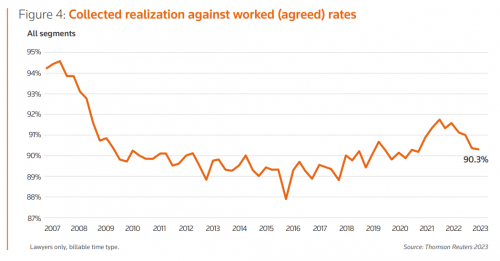Compliant legal time tracking may not be on every legal professional’s radar, but it should be. Not only to comply with regulations and standards set forth by the ABA, but also to lead law firms towards success.
Legal time tracking software that ensures legal compliance is one of the easiest ways to implement this at your law firm.
How Compliant Time Tracking Promotes Law Firm Growth
With manual time tracking, compliance requirements seem tedious and time-consuming. Your schedule is filled with a ton of items on your to-do list and you don’t have enough time to get everything done.
Then you’re hit with more work when inputting your work.
You’re required to adhere to a specific format at a specific time, expected to follow a specific set of standards, required to use legal codes to document your work, and to format your time sheets in a specific way.
This is where things can get tedious and mistakes can happen — unless you have the right legal time tracking software at your firm. With the proper legal software, it’s significantly easier to adhere to these kinds of compliance standards, leading to happier clients and a growing bottom line.
To fully understand the impact, we’ll examine the three pivotal reasons that demonstrate why compliant time tracking is the essential growth tool your firm needs.
1. Legal Compliance Regulations Keep Staff on the Same Page
Imagine a scenario where you have 25 attorneys on staff. In the process of adding their time, they decide to use their own legal codes on their timesheets and invoices.
How does this affect your business?
Let’s say you want to audit your financials at the end of the quarter. You’d like to know whether your billables are on target and the firm is making money. But then you notice each attorney used their own legal codes or task naming conventions.
Your audit is exponentially more difficult, especially if some of your staff are no longer on the team. How do you go about decoding each attorney’s individual codes?
Many attorneys are either not using these legal codes as outlined by governing bodies or they’re using them incorrectly. Estimates state as many as 60 to 80 percent of attorneys get this wrong, despite there being reputable guides available to follow. This can lead to stunted law firm growth, and even decrease firm revenue and lower reputation — making compliant time tracking vital.
How do you implement this in your firm? What does it really mean?
Compliant time tracking means:
- Everyone in your firm uses the same standard to track their time
- It’s easier for firms to analyze, improve and collect on billables
- There’s no need for staff to memorize messy naming conventions or unique customizations
Your firm is more productive, which means your firm is more profitable.
2. Increase Law Firm Growth With Legal Time Tracking Software
Collection realization rates are falling.
While hourly rates are increasing, collection realization rates are on a steady decline. There are a variety of reasons for this, but a commonly ignored reason is, you guessed it, compliance.
A standardized system (e.g. LEDES or UTBMS) means you and your clients are on the same page. Your clients understand what they’re being billed for and why. This means they’re more likely to be agreeable and more willing to pay their invoices.
Here’s why this matters.
More and more, sophisticated clients are using software to monitor your invoices. What are they looking for? Compliance with corporate parameters.
- Are expense categories e.g. meals, experts, out of town travel, approved?
- Are the partners/associates listed on this invoice authorized to work on this case?
- Do expense percentages comply with their rules?
- Are invoices in line with budget requirements?
Once a compliant time tracking standard is put into place and executed properly, law firms will be able to dive into reports and find insights to help increase profitability.
3. Compliant Time Tracking Helps Firms Gain Insights Into Profitability Metrics
There are very specific questions growing firms need answers to. Non-compliance makes it much harder to get these answers. In short, it makes it more difficult for your firm to grow.
What sort of questions?
- If you have multiple offices, which office is most efficient? Most profitable?
- Who are your most efficient/profitable partners, associates, paralegals and assistants?
- Who in the company is non-compliant?
- Which practice areas and tasks are most profitable?
- Which clients are most profitable/unprofitable?
Compliance = standardized data.
With compliant time tracking, you have everything you need to extract the valuable data your firm needs to grow. Think about the problems outlined in reason one. This data is incredibly difficult to come by if your firm isn’t on board with compliant time tracking.
Compliance makes it easier to extract the valuable performance data your firm needs to grow.
Create a Compliant Time Tracking Strategy
Compliance can be difficult, but legal time tracking software can make it easy and automatic.
You’re busy. Your schedule is filled with a long list of tasks to do. So automating this part of your practice opens up time for you and your staff to focus on other tasks insteading of compliance — let your legal software do the work for you.
Compliant time tracking reduces expenses. It minimizes the amount of work you’re required to do (see: manual billing and invoicing). It keeps your team on the same page, providing you with the precious data you need to grow your firm.
Compliance creates standards. It increases staff competence. It restores client confidence. It keeps your revenue flowing in. Here’s the good news. Compliant time tracking doesn’t have to be difficult.
In fact, with the right software, it’s automatic, and you’ll see compliant time tracking for what it is.
Your secret law firm growth strategy.



 />i
/>i



